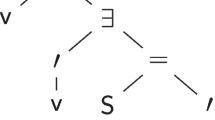Abstract
A system of finite mathematics is proposed that has all of the power of classical mathematics. I believe that finite mathematics is not committed to any form of infinity, actual or potential, either within its theories or in the metalanguage employed to specify them. I show in detail that its commitments to the infinite are no stronger than those of primitive recursive arithmetic. The finite mathematics of sets is comprehensible and usable on its own terms, without appeal to any form of the infinite. That makes it possible to, without circularity, obtain the axioms of full Zermelo-Fraenkel Set Theory with the Axiom of Choice (ZFC) by extrapolating (in a precisely defined technical sense) from natural principles concerning finite sets, including indefinitely large ones. The existence of such a method of extrapolation makes it possible to give a comparatively direct account of how we obtain knowledge of the mathematical infinite. The starting point for finite mathematics is Mycielski's work on locally finite theories.
Similar content being viewed by others
References
Ackermann, W.: 1937, ‘Die Widerspruchsfreiheit der allgemeinen Mengenlehre’,Mathematische Annalen 114, 305–15.
Detlefsen, Michael: 1986,Hilbert's Program, Synthese Library, Vol. 182, D. Reidel, Dordrecht.
Hallett, Michael: 1990, ‘Physicalism, Reductionism & Hilbert’, in A. D. Irvine (ed.),Physicalism in Mathematics, The University of Western Ontario Series in Philosophy of Science, Vol. 45, pp. 183–257, Kluwer Academic Publishers, Dordrecht.
Herbrand, Jacques: 1930,Recherches sur la théorie de la démonstration, PhD thesis, University of Paris.
Hilbert, David: 1926, ‘Über das Unendliche’,Mathematische Annalen 95, 161–90.
Jech, Thomas: 1978,Set Theory, Pure and Applied Mathematics, Academic Press, New York.
Knuth, Donald Ervin: 1974,Surreal Numbers: How Two Ex-Students Turned On to Pure Mathematics and Found Total Happiness: A Mathematical Novelette Addison-Wesley Publishing Company, Reading, Massachusetts.
Lavine, Shaughan: 1994,Understanding the Infinite, Harvard University Press, Cambridge, Massachusetts.
Levy, Azriel: 1979,Basic Set Theory, Perspectives in Mathematical Logic, Springer-Verlag, New York.
Maddy, Penelope: 1989, ‘The Roots of Contemporary Platonism’,Journal of Symbolic Logic 54, 1121–44.
Maddy, Penelope: 1992, ‘Indispensability and Practice’,Journal of Philosophy 89, 275–89.
Makkai, M.: 1977, ‘Admissible Sets and Infinitary Logic’, in John Barwise (ed.),Handbook of Mathematical Logic, number 90 inStudies in Logic and the Foundations of Mathematics, chapter A.7, pp. 233–91. North-Holland Publishing Company, Amsterdam.
Mycielski, Jan: 1980–1981, ‘Finistic Real Analysis’,Real Analysis Exchange 6, 127–30.
Mycielski, Jan: 1981, ‘Analysis without Actual Infinity’,Journal of Symbolic Logic 46, 625–33.
Mycielski, Jan: 1986, ‘Locally Finite Theories’,Journal of Symbolic Logic 51, 59–62.
Mycielski, Jan: 1989, ‘The Meaning of Pure Mathematics’,Journal of Philosophical Logic 18, 315–20.
Mycielski, Jan: 1992, ‘Quantifier-free Versions of First-order Logic and their Psychological Significance’,Journal of Philosophical Logic 21, 125–47.
Parsons, Charles: 1977, ‘What is the Iterative Conception of Set?’, in R. E. Butts and J. Hintikka (eds.),Logic, Foundations of Mathematics, and Computability Theory, Proceedings of the Fifth International Congress of Logic, Methodology, and the Philosophy of Science (London, Ontario, 1975). D. Reidel, Dordrecht.
Pawlikowski, Janusz: 1989, ‘Remark on Locally Finite Theories’,Abstracts of Papers Presented to the American Mathematical Society 10, 172, Abstract.
Resnik, Michael D.: 1980,Frege and the Philosophy of Mathematics, Cornell University Press, Ithaca.
Tait, William W.: 1981, ‘Finitism’,Journal of Philosophy 78, 524–46.
Tarski, Alfred and Steve Givant: 1987,A Formalization of Set Theory without Variables, Number 41 in American Mathematical Society Colloquium Publications, American Mathematical Society, Providence, Rhode Island.
Vaught, Robert L.: 1967, ‘Axiomatizability by a Schema’,Journal of Symbolic Logic 32, 473–79.
Vaught, Robert L.: 1985,Set Theory, An Introduction, Birkhäuser, Boston.
Author information
Authors and Affiliations
Additional information
I would like to thank Jeff Barrett, Akeel Bilgrami, Leigh Cauman, John Collins, William Craig, Gary Feinberg, Haim Gaifman, Yair Guttmann, Hidé Ishiguro, Isaac Levi, James Lewis, Vann McGee, Sidney Morgenbesser, George Shiber, Sarah Stebbins, Mark Steiner, and an anonymous referee for encouragement and various useful suggestions. The research described in this article and the preparation of the article were supported in part by the Columbia University Council for Research in the Humanities.
Rights and permissions
About this article
Cite this article
Lavine, S. Finite mathematics. Synthese 103, 389–420 (1995). https://doi.org/10.1007/BF01089734
Issue Date:
DOI: https://doi.org/10.1007/BF01089734



